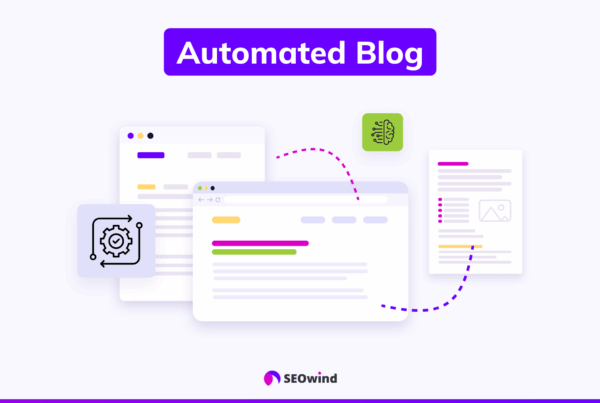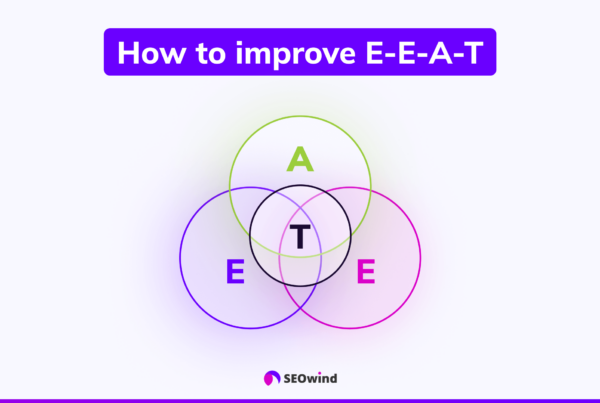One of the most important factors for achieving high rankings is topical authority. Let’s look at what it is, how it works, and how it impacts your SEO strategy.
When it comes to SEO activity, a great deal of importance is always placed on keywords and linking. These are both universally accepted to be essential to properly optimize content in order to achieve high rankings. This in turn ensures that users see your content at the top of result pages and click through.
However, times change and search engines evolve. What was of the utmost importance for determining ranking is dynamic, so you’ll need to adapt. After all, search engines are dedicated to delivering relevant resources to users, not to supporting the visibility of content. To this end, Google has improved its algorithm to better identify web pages that fit queries. While keywords and links remain important, new factors play a greater role now. Now it’s time for topical authority.
TL;DR
- A topical authority is a critical factor in achieving high rankings on search engines. It represents how credible and trusted a website is in a specific field.
- A topical authority is measured by Google to determine how important a website or page is to user searches and how well it meets the user’s needs.
- Google’s Hummingbird update in 2013 expanded its ability to identify topically relevant content and review material on a semantic level, reducing the importance of keywords and keyword links.
- Building topical authority requires creating and publishing a variety of high-quality, informative, and comprehensive content that explores related subjects and covers subtopics and themes connected to the primary subject.
- Building topical authority will benefit a business by driving more organic traffic, more backlinks to the website, and increased brand reputation.
- The deeper a website explores a topic, the more likely Google will identify it as a trustworthy source.
- Becoming a perceived expert in a topic improves the overall view of the organization, inspires broader brand loyalty and engagement, and establishes the website as one of the go-to resources for that topic.
At a fundamental level, topical authority represents how trusted and credible a website or source is. Typically, it also indicates proven expertise in a certain field or lack thereof.
More practically, topical authority (also known as topical relevance) is a way that Google measures the importance of a website or page to user searches. A higher rating means that Google recognizes a website as a trusted source that it will draw from readily. It also indicates how well you know your audience and what they’re looking for based on the traffic your content attracts.
The more high-quality and broadly informative content a business publishes, the more you’ll earn that trust. This results in a chain reaction of higher rankings, changing perception of your business, and higher engagement. To get to that point, your website needs to meet your users’ needs and answer their questions thoroughly.
Although Google hasn’t yet provided a public definition of topical relevance, we still know quite a bit about it. We can be certain that it is a part of the search engine’s ranking algorithm. We also know that if you achieve a high authority ranking, Google is more likely to feature your future content.
But let’s dig a little deeper.
Topical authority and Google Hummingbird update
Traditionally, Google has heavily relied on keywords, backlinks, and a variety of other ranking factors. As a result, marketers overly relied on these techniques, which discouraged a focus on high-quality publications.
However, in 2013 the search engine introduced Hummingbird, which updated the way it analyzes content. This has expanded Google’s ability to identify topically relevant content and review material on a semantic level. Hummingbird has reduced the predominance of keywords and keyword links in SEO by enabling a deeper level of analysis. While these remain important techniques, the balance has shifted and other factors have taken priority.
A topical authority is a primary driver of SERP ranking
As Google has gotten better acquainted with reviewing semantics, the topical authority has grown in importance. Although a keyword link will always be relevant and useful, strategies that emphasize authority SEO have become at least as effective.
This kind of ranking boost is driven largely by the depth to which a website explores a topic. As a result, page authority meaning relies on creating and publishing a variety of content that explores related subjects. As such, it’s essential to dive deeper and cover subtopics and themes connected to the primary subject.
In the future, this emphasis on depth and comprehensive coverage will only increase its relevance to ranking.

Attracting readers to marketing content isn’t much different than earning brand loyalty in a brick-and-mortar store. At the end of the day, shoppers care most about your ability to meet their needs. And they will always become more engaged if you can offer a unique offering or exceptional expertise and passion.
So, when you explore a topic more deeply and establish topical authority, Google will identify you as a trustworthy source. Think of this as another form of optimization, just focusing on expertise and reliability rather than page structure.
But how will doing so benefit your business?
More organic traffic
Traffic is not the be-all and end-all of success, but it is a major component. Publishing effective authority content builds your relationship with Google, which will cause your rankings to improve. As a result, pages from your website rise up results pages, where users will be far more likely to click on them. Topical authority SEO techniques thus drive traffic which increases user engagement and gives you more opportunities to convert leads.
More backlinks to your website
While we’ve largely focused on the effect that topical authority will have on user engagement, that’s not the limit. What about other marketers out there? How will they interact with your content if you effectively utilize authority SEO techniques?
Well, your target audience isn’t the only ones looking for more information on a given subject. When other businesses are looking to publish content, they often use Google just like everyone else. So, if Google considers you to be a source of topical content and your ranking improved, where will other organizations turn for reliable insights?
That means that during topical research, you’ll be the expert everyone links to as a reference for their own content.
Increased brand reputation
So, if Google users and other businesses see your website with every search and reference your content, what does that mean for you? At that point, you’ve become one of a few go-to resources for that topic. By becoming a perceived expert, you will improve the overall view of your organization.
Remember, rising tides lift all boats. As a topical authority, you’ll inspire broader brand loyalty and engagement. Just think about who you go to with a question on a new topic: someone new or an expert you’re familiar with. While this is hard to quantify, it is a direct benefit that topical authority makes possible.

If we know what topical authority is and how it can help your SEO strategy, then how does it work?
As we said earlier, keywords and links no longer dominate Google’s algorithm. But they still play a critical role in establishing topical relevance. For example, keywords don’t need to comprise the entirety of your SEO strategy but they should be involved. A true SEO authority will likely use keywords both purposefully and incidentally. Remember that topical authority largely indicates the degree of relevance of your content to the query. Expertise naturally lends itself to impactful material suited to your topical subject.
It will also make it easier to publish the kind of high-quality content that inspires user engagement. By drawing upon your expertise and developing great and informative content that explores the entire spectrum of a chosen topic, you will achieve authority in the eyes of Google and your audience.
In part because search engines like Google have yet to clearly explain how the authority of a website factors into its ranking, it doesn’t remain easy to track. However, there are still ways to tell how well your topical SEO strategy is working.
One of the primary benefits of topical authority comes in the form of increased traffic. As such, one way to get a measurement of your SEO relevance and authority is to look at your traffic share. The number of tools can determine how many users searching for a particular topic end up on your website. The size of your slice of the pie will provide an idea of the perception of your website among members of your target audience.
In addition, keyword ranking remains a useful metric for determining the performance of your content. If all of your publications rank well for their targeted search phrases, this can indicate that you’ve achieved authority.
It’s great to know how topical authority works. But it’s another question entirely to properly establish sufficient relevance to realize the benefits you’re expecting. Every business will approach this differently, but there are a set of common tricks that you can apply. We’ll go over them here and explain how each contributes to building authority.
Do your research

The basis of any informative article is the research that supports it. Even experts need to keep up to date on new information relevant to their subject matter. Remember, topical authority isn’t just communicating your views and thoughts on the topic. It’s about recognizing your audience’s interests. It’s about answering their questions. So, even if you think you know everything there is to understand about a topic, dig deeper. Make sure you understand what users want to know so that your content fits their specific interests.
This is where I’d recommend using a keyword tool or a similar solution. Doing so will cut down your research time while delivering the informational foundation you need to publish relevant content.
Map out your content
When you’re looking to establish topical authority, it’s incredibly useful to do some topical mapping. Identify topic clusters you want to cover and find connections between them.
Cover a wide range of subjects
If you want to be perceived as an expert, you need to cover the width and breadth of your chosen topic. It’s not enough to simply focus on one core idea. Instead, you need to understand what other topics are related and cover them. This will enable your business to demonstrate true awareness and capture leads at various stages of the buying journey.
These primary topics will form the foundation of your topical map SEO approach and will lead into related ideas.
Add depth with subtopics
Once you have the width of topics covered, it’s time to cover the depths as well. Remember that this is where topical authority is truly determined. Rather than simply developing pillar content to present the broad subject, make sure to identify subtopics that inspire supporting material. Make sure that each piece focuses on different keywords but shares a connection to the main concept. Then look to connect your various clusters, which will not only keep people on your website but also inform Google of the connections between different topics. You can use keyword clustering tools to analyze that for you.
Optimize keyword focus
While we always want to maximize the ground we cover, it’s also important to remain efficient with our time. It’s important to diversify the keyword focus of your various content, but if you do a little extra digging, you can find opportunities to do more with less.
Some keywords and phrases have a strong enough relationship that they don’t require separate articles to compete for ranking. If you were to make one page to compete for “what is topical authority” and another for “how does topical authority work,” you might limit your potential. The two pieces of content will split the traffic between them, decreasing the maximum engagement either can achieve.
Map out your keywords and content plan to avoid keyword cannibalization like this.
Quantity over quality
I know it’s been a bit of a cliché, but high-quality content is better than high-volume content. Remember that the reliability of your website is just as important as how comprehensively you cover a topic.
In some cases, it’s more effective to publish a single, in-depth article rather than three that excessively split up a topic. Knowing the best approach requires research and an understanding of your topic and subtopics.
For example, let’s say you’re preparing to write an article covering automotive SEO techniques. Rather than publishing this piece and then three others, look for ways to include related themes in one place. Add sections that cover automotive industry trends, content layout, and topic research so that the one article covers as much ground as possible.
And when you’re planning out your content, make sure that every piece provides something unique. They should be connected, but have minimized overlap so that you’re not covering the same ground again and again.
Develop a consistent voice
While every article and blog should cover its specific topic, you want them to all be recognizably yours. To do so, establish a common voice that you can use for every iteration of a type of content. This ensures that every topical example will share a stylistic connection. In addition, at whatever point you have multiple people developing content, this will help keep your website unified.
Optimize crawl efficiency
If you want search engines to trust your content, you need to make it easy for them to index your website. Crawl efficiency determines how easily bots can go through your content and identify connections between different topics. To this end, make sure to use proper internal linking, which will guide both automated and human readers through your site.
Actively promote your content
While topical relevance SEO activity is essential for success, you shouldn’t simply rely on search engines to drive traffic. Instead, use social media channels to promote your publications and manufacture traffic. Let people know that you’re a topical expert and that you’re publishing content they’d be interested in reading. Guest posting represents another great opportunity for reaching people who might not have found your content on their own.
Review published content regularly
While we’ve mostly focused on new content throughout this article, existing material is a fertile frontier for building authority. Once a page goes live, you need to make sure to keep it up to date. As new information hits the market, audit your content catalog and update what you can to bring fresh traffic to content that already exists.
A few more tips
Before we wrap up, there are a couple more tips that we’d like to share for you to consider. First, just because a topic hasn’t been covered before doesn’t mean you shouldn’t cover it. It’s incredibly valuable to keep an eye out for new trends that you can jump on early.
Also, if you trust an outside source, link to it to show you’ve put in time on research. This will inspire readers’ trust in your content and let them verify any claims you want to make.
And there you have it. Topical authority plays a major role in how your website performs, the user traffic you can attract, and your general brand image. While it’s a more nebulous concept than keyword ranking or internal linking, we hope that this article provides a good starting point for your business to improve its authority standing.
FAQ
What is SEO authority?
SEO authority is a measure of your website’s ranking and general exposure. Domain authority is a metric that indicates SERP ranking potential. When looking into how to increase domain authority in 2023, consider your website’s overall SEO health.
What is a topical authority in SEO?
A topical authority is a website that has covered a topic extensively enough so that the business is considered an expert. This is dependent on a variety of SEO techniques, such as keyword ranking and internal linking. To achieve this status, you’ll need to cover a primary topic as well as subtopics and related themes.
How important is page authority in SEO?
Higher page authority typically means higher SERP ranking, as it factors into Google’s ranking algorithm. As a result, page authority has a direct impact on the amount of traffic your website generates. It can also improve the general perception of your business and lead to references on other websites.


